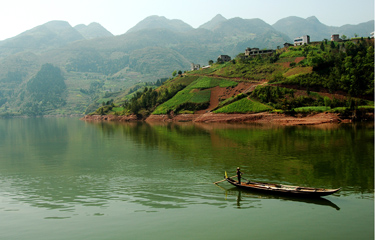Surveillance drones and patrol boats are being deployed in greater numbers than ever before as China’s unprecedented 10-year ban on fishing in the Yangtze River kicks off this week.
According to Yu Kangzhen, China’s vice minister for agriculture, who also has responsibility over the country’s fisheries, the ban is part of the Chinese government’s flagship strategy to rehabilitate its inland fisheries. Yu is emphasizing a “just transition” for fishing communities as they enter the 10-year timeframe of the ban.
In a statement outlining the move, Yu explained how 10 government ministries – including the ministries of finance and labor – have been involved in implementing the ban, which aims to protect depleted species like the Yangtze alligator, dolphin, and sturgeon, which have all but disappeared from the river, which is the longest in China and the third-longest in the world. The fishing catch shrunk from 430,000 metric tons (MT) in 1954 to 100,000 MT in 2018, according to the statement.
China’s efforts with the Yangtze will be watched globally, given the extent of the problem and the apparent success of some measures already taken. The ban comes as China prepares to host a major United Nations biodiversity conference later this year in Kunming.
Since the 1950s, numerous dams and irrigation channels have disrupted the river’s natural flow, hurting fish stocks and cutting more than a hundred lakes off from the river. Lakes that remain connected, like Poyang Lake and Dongting Lake, are major brand names in Chinese seafood markets.
Most conservationists agree the baiji dolphin, which has near-mythical status in Chinese culture, is extinct, though this is disputed in Chinese documents. Several lakes were reconnected to the Yangtze in the past two decades and protected habitat areas have been established to protect wetland landscapes.
Nevertheless, the Yangtze is the biggest source of plastic waste entering the seas globally, according to several international environmental NGOs.
Photo courtesy of Stephen Rudolph/Shutterstock







